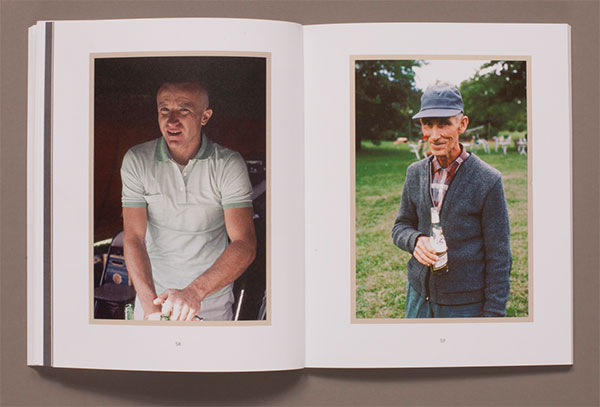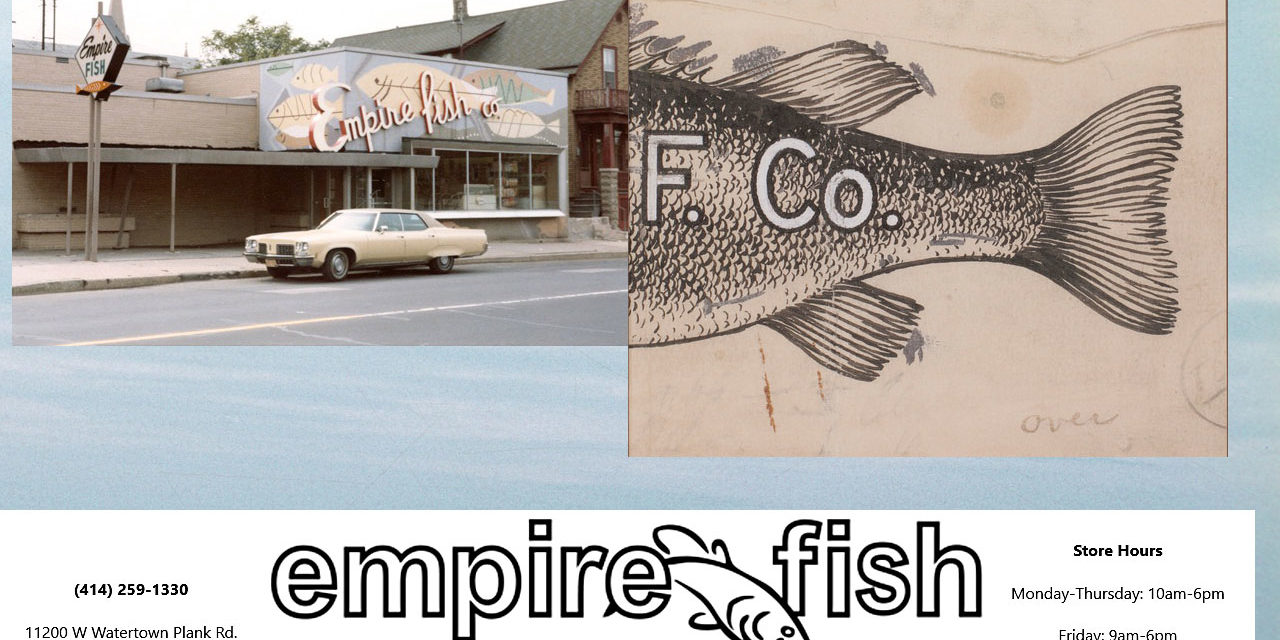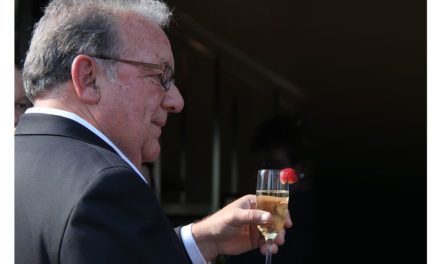BY JENNY WISNIEWSKI
 Wauwatosa is home to a significant piece of Wisconsin’s fishing history – Empire Fish. The heirs of this history, though no longer holding the keys to the store, are three siblings, Joe, Andrew and Peggy Kutchera. A new self-published book and photo exhibit, Faces of a Fish Empire, serves both as a tribute to their father, Tom Kutchera, and a testament to the industrious men and women who brought fish to the tables of many in southeastern Wisconsin throughout the twentieth century. Through this work, the brothers Kutchera chronicle the fishing industry both at its peak and through its decline.
Wauwatosa is home to a significant piece of Wisconsin’s fishing history – Empire Fish. The heirs of this history, though no longer holding the keys to the store, are three siblings, Joe, Andrew and Peggy Kutchera. A new self-published book and photo exhibit, Faces of a Fish Empire, serves both as a tribute to their father, Tom Kutchera, and a testament to the industrious men and women who brought fish to the tables of many in southeastern Wisconsin throughout the twentieth century. Through this work, the brothers Kutchera chronicle the fishing industry both at its peak and through its decline.
In the 1950s while serving in the U.S. Army in Germany, Tom Kutchera bought a Leica 35mm camera and taught himself the art of photography. Little did he know that decades later his collection of portraits would be scrutinized upon his passing. Tom had spent over twenty years, from the 1960s through the 1980s, photographing his Empire Fish employees at work, their Christmas parties, their company picnics. At the last minute, his family chose to display the portraits along with family photos at his funeral in April, 2016.

When Naomi Shersky, a professional photographer and instructor at Milwaukee Institute of Art and Design, accompanied a friend to the funeral, she didn’t realize she was stepping into an undiscovered photo exhibit. “I was surprised by what I found,” Shersky said. “It wasn’t the typical quotidian photos. The portraits showed something tender between the subjects and their boss. They seemed so casual and familial. I was instantly smitten by the photos.” So smitten that the following day Shersky approached Kutchera’s children and asked them if she could put together an exhibit. Three months later the exhibit opened at the Portrait Society Gallery in Milwaukee.
The exhibit garnered interest from both the art and academic communities as well as those with an interest in Milwaukee’s fishing history. The pictures were accessible to both, Shersky explained. “When I think about what compelled me to show this work,” she continued, ”I think there was something so innately Wisconsin. These were really the people who toiled behind the scenes. There was something too poignant to let the photos just go back into a box.”

Andrew inherited his father’s artistic inclinations. Now living in Los Angeles, Andrew works as a senior lecturer at the University of Southern California’s Roski School of Art and Design and as an independent art director and graphic designer. It was Andrew who designed the book, Faces of a Fish Empire, winning a silver medal for it in the International Design Awards.
The vintage Empire Fish logo on the cover of the book, in particular, conveys a “nostalgic, handmade and local quality,” Andrew said. It also contains “the small bits of symbolism” for which Andrew was aiming, speaking to the decline and near disappearance of Wisconsin’s fishing industry. “It is a little odd to have the tail of the fish (on the front cover) rather than the head. Then I decided that the tail was more appropriate because it symbolizes the end of the fishing industry,” he added.
Before the Kutchera brothers talked about the end, they reminisced about the beginning, a beginning documented in a manuscript written by their father, Tom. It included memories gathered by Tom’s father, Harold, including history of Tom’s grandfather and founder of the business, Jerry. Joe edited and updated the manuscript, and used it to complement the portraits, transforming the collection into Faces of a Fish Empire. While this book is a “homage” to their father, as well as Wisconsin’s many family fish businesses, the continuing existence of the thriving business is also a homage to these three men (along with a number of other family members) who were able to ride the waves of change and reinvent themselves when needed.
The story starts in 1913 on 24th and Vliet streets in Milwaukee, where Jerry founded Empire Fish. At that time it fit right in with the many other small neighborhood stores endemic to the period. The fish were kept in large bins filled with ice that came from nearby lakes and rivers. As time went on, the store expanded, moved farther down Vliet, was renovated, diversified product lines, added refrigeration and freezers.
Jerry’s son, Harold, valedictorian of the Milwaukee County School of Agriculture and Domestic Economy located on the County Grounds in Wauwatosa, began working at Empire Fish in 1924 at age 18 and didn’t quit until he retired in 1995 at the age of 89. Harold was a “salt of the earth kind of guy,” according to his grandson, Joe. He loved the routine of the business and building relationships with customers and restaurateurs.
With the help of Harold, Tom, who joined his fish mongering family in 1956, moved the business to its final home in Wauwatosa in 1976. It was the 1970s, the restaurant business was booming, and again they needed more space.
It was around this time that Tom commissioned a local designer to create a fresh logo for the store. As grocery stores grew and expanded, he also recognized that he needed more than just fish to pull in customers. “He created a tiny culinary emporium,” Andrew explained, a precursor to upscale groceries of today. Tom hung flags of various countries and brought in crackers, cheeses and spices from around the world.
Joe, Andrew and Peggy grew up in Wauwatosa and all worked at Empire Fish on weekends and during school breaks. Of the three, Joe worked the longest stint, on and off for 11 years. Beginning at the age of 15, he was tasked with picking up cigarette butts in the parking lot. He spent his final years in sales. Ultimately, he decided to move on, taking with him a small piece of his father, his love of language. Joe has written two books and is now a digital marketing and content advisor, living with his wife, Lulu, and family in Richmond, Virginia.
As for Empire Fish, Tom and Harold sold it in 1995 to two brothers, and the business is now a part of Neesvig’s Food Service.

As a senior at Wauwatosa East High School in 1988, Joe took Carolyn Bertorello’s legendary creative writing class. His Dad often helped him with assignments. One day after work, Tom asked Joe if he would like to go to a poetry reading at Marquette University. Picturing a small room with himself, his Dad, the poet and few others, they arrived to a very different scene. It was standing room only in a stuffed auditorium. The poets? Allan Ginsburg and William Burroughs. “I realized then that my Dad was actually really cool.”
Though he grew into the family business of selling fish and became an adept businessman, at his core Tom Kutchera was a humanist, an artist and a life-long learner. After attending Marquette University High School and receiving an undergraduate degree in literature and economics at Marquette University, Tom returned to school after his two-year stint in the army to receive his master’s degree in literature on the GI bill.
As he went on to a career at Empire Fish, his involvement in the humanities never ceased. In the 1960s, Tom would use his education to teach English literature at MATC at night. He also served on the Milwaukee County Federated Library Board and the Wauwatosa Library Board.
In addition to their field trip to listen to the Beatniks, Tom and his wife Barbara exposed their children to many other cultural events, one a photo exhibit at Chicago’s Art Institute. Richard Avedon’s “In the American West” became a formative experience in Joe’s life and one he would hold dear many years later when his father’s own photo exhibit would take form. “My dad’s photos have the same ethos,” Joe said. “He captured people’s lives as ordinary people but also as his extended family.”

In talking with Joe and Andrew about their role in preserving Wisconsin’s maritime history, I was reminded that I, too, am witness to commercial fishing’s heyday and its demise. I grew up on the shores of Lake Michigan, north of Port Washington, another fishing community that no longer fishes (at least commercially). I recall one inky black night when my father led me by the hand to our beach. It was springtime, the season when Smelt fishermen sought their prey at night. Though I couldn’t see the fish that they pulled in, I could see their bonfires twinkling like tiny fireflies up and down the beach.
I remember the alewives too, their silvery carcasses washing up in piles on shore, mixing their stench in my sandy playground. The alewives began arriving in the late 1960s, one of many invasive species that would put a slow stranglehold on the lake’s ecosystem and the family fisherman’s livelihood. The alewives have become infamous intruders, like the quagga mussels and Asian carp that followed, as much a part of our history as Friday Night Fish Fries.
The invasive species are a piece of Lake Michigan’s narrative. Overfishing is another. The industrialization of the food business plays a part, too. As Joe documents in Faces of a Fish Empire, over 50 commercial fishing businesses existed in the Milwaukee area during the Great Depression. By 2000, only 2 still existed. In 2011, the last commercial fisherman left the Milwaukee area.
And so, Empire Fish gradually, and then more fervently, turned towards shipping in fish from the coasts, internationally, and more recently, purchasing from fish farms. Because the Kutcheras embraced change, Empire Fish continues to exist.
And because Tom Kutchera cared enough to document the lives of its workers, its rich history remains too.
To learn more about Faces of a Fish Empire and download a free chapter of the book, visit http://joekutchera.com/books/faces-fish-empire/
What’s Next?
In 2018, Empire Fish underwent another change, though one that Manager Nick Weeks says has little if any impact on the store as most retail customers know it. The building that Tom and Harold built has been sold, the wholesale division moved to Neesvig’s headquarters in Madison, and the store’s front-space continues as the retail division of the company.
The move comes as Empire Fish expands, the same reason for its arrival in Wauwatosa 40 years ago. The move will also lead to more efficiency through the consolidation of Neesvig’s meat and fish wholesale operations.
Though supplying fish from Lake Michigan has ceased, Empire Fish has turned to purchasing farmed fish from Wisconsin, in addition to purchasing from its many suppliers across the country and internationally.
As our food sensibilities and environmental challenges evolve, Empire Fish focuses both on sustainability and consumer education. “We recognize that you can buy fish at any grocery store,” Weeks said. “We like to think that we have a bit more knowledge going across the counter.”





